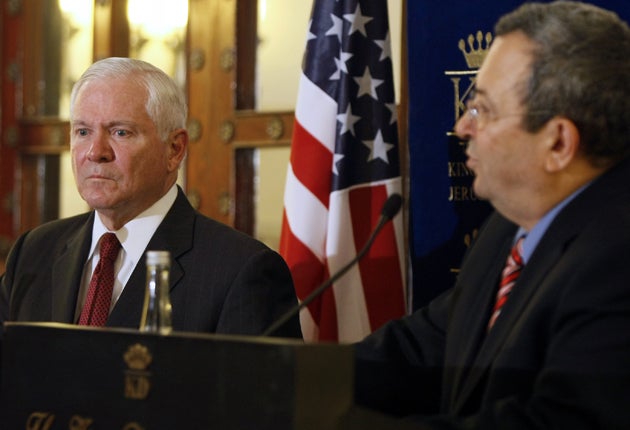Gates in plea to Israel for 'patience' over Iran
US fears Israel may take military action over Iran's nuclear programme

Your support helps us to tell the story
From reproductive rights to climate change to Big Tech, The Independent is on the ground when the story is developing. Whether it's investigating the financials of Elon Musk's pro-Trump PAC or producing our latest documentary, 'The A Word', which shines a light on the American women fighting for reproductive rights, we know how important it is to parse out the facts from the messaging.
At such a critical moment in US history, we need reporters on the ground. Your donation allows us to keep sending journalists to speak to both sides of the story.
The Independent is trusted by Americans across the entire political spectrum. And unlike many other quality news outlets, we choose not to lock Americans out of our reporting and analysis with paywalls. We believe quality journalism should be available to everyone, paid for by those who can afford it.
Your support makes all the difference.The United States has once more urged Israel to remain patient as it attempts to reignite fizzled diplomatic contacts with Iran over its nuclear enrichment programme while indicating that the window for Tehran to respond would not remain open for ever.
The message, which betrays renewed anxiety in Washington that Israel may be tempted to take military action, was carried to Jerusalem yesterday by the US Defence Secretary, Robert Gates, who held talks on regional security with his counterpart Ehud Barak and the Israeli Prime Minister, Benjamin Netanyahu.
For their part, the Israeli officials did little to hide their impatience with the diplomatic track apparently still preferred by Mr Gates and by his boss, President Barack Obama.
"I don't think that it makes any sense at this stage to talk a lot about it," Mr Barak flatly said during a joint news conference at the King David Hotel, referring to the efforts by Western nations to engage with Iran on its nuclear activities. But rather than dismissing the US policy entirely, he said that talks with Iran should be "short in time, well defined in objectives, followed by sanctions". Mr Obama has recently suggested that he would expect some serious response from Iran about the prospect of a negotiated solution to the nuclear stand-off before heads of government gather in New York in September for the annual United Nations General Assembly – a deadline that does not leave a lot of spare time.
Ignoring all appeals from Western states, including Britain, that it should desist, Iran continues to enrich uranium in a programme that it says is geared only towards civilian purposes, namely generating energy. But the US – and Israel – is persuaded that Iran intends to turn itself into a nuclear power. There were repeated attempts during the Bush years also to negotiate a deal with Iran, but they always stalled without a solution.
A statement from Mr Netanyahu's office played down tension between himself and the US on the issue. "Gates said the United States and Israel see eye-to-eye with regard to the Iranian nuclear threat," it said. And for his part, Mr Gates told reporters that Israel understood that the US approach might yet work. "I think, based on the information available to us, that the timetable that the President has laid out still seems to be viable and does not significantly increase the risks to anybody," he said.
He added that Israel seemed prepared to go along with the US "as long as the process is not completely open-ended" – a reference to the September deadline set by Mr Obama. "Our hope remains that Iran would respond to the President's outstretched hand in a positive and constructive way, but we'll see."
While Joseph Biden, the US Vice-President, has said that the US "cannot dictate" to Israel how it manages its foreign policy, others in the US administration, President Obama included, have in recent weeks made clear that they have by no means given a green light to the Israelis to open any kind of military assault on Iran, a step that could profoundly destabilise the region, still recovering from the protracted Iraq conflict.
But Israel continued to make clear that military action remains an option, without saying so in specific terms or directly threatening Iran. "We clearly believe that no option should be removed from the table ... We recommend to others to take the same position but we cannot dictate it to anyone," Mr Obama said.
With the Middle East an urgent priority in Washington, Mr Gates' visit to Israel coincided with a tour of the region by the President's special peace envoy, George Mitchell. His main focus is restarting stalled talks between the Palestinians and Israel on a two-state solution. After talks on Sunday with President Shimon Peres, Mr Peres gave no indication whether he had made progress on a US request that Israel end building settlements in the West Bank.
In New York, the acting British ambassador to the UN, David Quarrey, reiterated London's dismay over the continuing settlements expansion during a debate at the Security Council last night. "Such settlements are illegal under international law, and their continued expansion goes against the overwhelming international consensus and indeed the decisions of this Council," he said. "It creates a further obstacle to the two-state solution, which is the only sustainable response to the aspirations of both parties."
Join our commenting forum
Join thought-provoking conversations, follow other Independent readers and see their replies
Comments